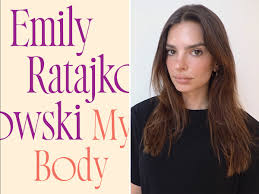Book Review: My Body by Emily Ratajkowski

January 16, 2022
In “My Body,” model and actress Emily Ratajkowski attempts to come to terms with who she is as a person outside of the “beautiful model” label she’s been confined to. The series of essays released on October 19, 2021 explores the pitfalls of “pretty privilege” from the perspective of a person whose life and eventual career have been largely defined by their attractiveness. Ratajkowski references times where her beauty made her feel powerful, but also the times where she felt the most powerless. The memoir is a raw exploration of power, sexuality, and femininity, but still feels disingenuous in some places. It may seem unusual for a celebrity memoir to not include a picture of that celebrity on its cover, especially a memoir written by a model, but Ratajkowski’s making the cover of her book about redefining herself outside of the male gaze aligns with her point.
The first essay, “Beauty Lessons,” shows how, since Emily was a child, she was taught she would always be defined by her beauty. Even as a newborn, when she was a day old, her mother’s doctor brought his children just to see how beautiful baby Emily was, as her mother has told her many times. Her mother was very beautiful and was taught by her father that she owes anyone who compliments her more than just a thank you. She would pass these lessons onto Emily. Emily also discusses in this chapter how her body would also lead to negative attention, like when she was sent home from a dance for wearing a too-revealing dress due to her developed body. This essay is a great introduction to just how much her beauty would affect her life and how little control she had over it. Next from the collection is “Blurred Lines,” which is about her career’s beginning and the infamous music video that helped launch her to celebrity. Emily started modeling. During the filming of the music video, Emily alleges that Robin Thicke drunkenly touched her without her consent and an accusation that was backed by the director. The next essay, and probably my favorite one, is entitled “My Son, Sun,” which is about Ratajkowski’s ex-boyfriend Owen, who regularly forced himself on her. Emily remembers being scared of Owen, all while believing she owed him a relationship. Years after breaking up (or in Emily’s word, “escaping”) with Owen, Emily found out through Facebook that Owen had died. At his funeral, his father describes him as his sun: “My son, sun, son.”
Emily discusses how she was able to profit from her body and the male fantasy in a capitalist patriarchal society in several essays.While she talks about how it led to her objectification and also acknowledges the privileges she had that allowed her to do so, she sees it as an empowering thing, which is my biggest problem with the book. Along with that, I also feel that her critiques of exploitative industries like the modeling industry only expand to include their treatment of her.
The book received praise, but it was criticized by feminists for “exploiting her trauma” to make a profit. This criticism mostly came from her decision to wait until 8 years after the release of Blurred Lines to accuse Robin Thicke. I disagree with this criticism as Emily was a 21-year old new model who would have been met with tons of invalidating and misogynist rhetoric that was so prevalent in early 2010s media. Another critique the book was met with was over Emily “complaining about being pretty”. In my opinion, if you read this book and came out thinking she was just complaining about being the beauty standard, you lack basic comprehension skills. Overall, I think whether you like the book or not depends on your personal beliefs. However, I would recommend it.
